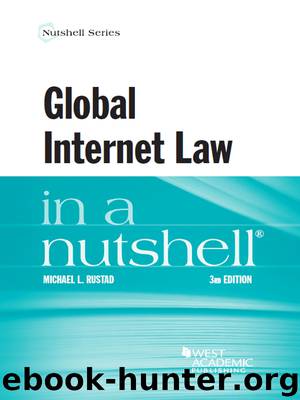Global Internet Law in a Nutshell by Michael Rustad

Author:Michael Rustad
Language: eng
Format: epub
ISBN: 9781634604505
Publisher: West Academic
Published: 2015-11-22T16:00:00+00:00
(4) Article 17: Right to Be Forgotten
The European Union right to be forgotten can be conceptualized as taking three forms: (1) the right to have information deleted after a preset period; (2) the right to have a clean slate; and (3) the right to be connected to current information and delinked from outdated information. See Bert-Jaap Koops, Forgetting Footprints, Shunning Shadows. A Critical Analysis of the “Right To Be Forgotten” in Big Data Practice, 8 SCRIPTED 229, 236 (2011). A data subject has the right to erase links to data relating to him or her if the information is:
no longer necessary in relation to the purposes for which [it was] collected or otherwise processed, where data subjects have withdrawn their consent for processing or where they object to the processing of personal data concerning them or where the processing of their personal data otherwise does not comply with this Regulation.
Article 17 provides the data subject’s right to be forgotten and to erasure. Article 17 further elaborates and specifies the right of erasure provided for in Article 12(b) of Directive 95/46/EC and provides the conditions of the right to be forgotten, including the obligation of the controller 225
which has made the personal data public to inform third parties on the data subject’s request to erase any links to, or copy or replication of that personal data. It also integrates the right to have the processing restricted in certain cases, avoiding the ambiguous terminology “blocking.” The EU Commission’s Explanatory Memorandum makes a policy-based decision that the data controller, not the data subject, must notify third-party websites that a data subject has requested that it “erase any links to, or copy or replication of … personal data.” Article 17(1) sets forth the ground rules for when data subjects have a right to be forgotten:
The data subject shall have the right to obtain from the controller the erasure of personal data relating to them and the abstention from further dissemination of such data, especially in relation to personal data, which are made available by the data subject while he or she was a child, where one of the following grounds applies:
(a) the data are no longer necessary in relation to the purposes for which they were collected or otherwise processed;
(b) the data subject withdraws consent on which the processing is based according to point (a) of Article 6(1), or when the storage period consented to has expired, and where there is no other legal ground for the processing of the data;
(c) the data subject objects to the processing of personal data pursuant to Article 19;
226
(d) the processing of the data does not comply with this Regulation for other reasons.
Article 17(2) states, “Where the controller referred to in paragraph 1 has made the personal data public, it shall take all reasonable steps, including technical measures, in relation to data for the publication of which the controller is responsible, to inform third parties which are processing such data, that a data subject requests them to erase any links to, or copy or replication of that personal data.
Download
This site does not store any files on its server. We only index and link to content provided by other sites. Please contact the content providers to delete copyright contents if any and email us, we'll remove relevant links or contents immediately.
Mastering Bitcoin: Programming the Open Blockchain by Andreas M. Antonopoulos(3026)
Dawn of the New Everything by Jaron Lanier(2760)
Blockchain: Ultimate Step By Step Guide To Understanding Blockchain Technology, Bitcoin Creation, and the future of Money (Novice to Expert) by Keizer Söze(2471)
Alibaba by Duncan Clark(2069)
Foundations of Blockchain by Koshik Raj(1974)
Owning Bitcoin: The Illustrated Guide to Security, Privacy, and Potential by Apodaca Richard(1957)
Significant Zero by Walt Williams(1953)
The Mastermind by Evan Ratliff(1925)
Mastering Blockchain by Imran Bashir(1858)
Bitcoin: The Basics of Blockchain and Investing in Cryptocurrency by K. Connors(1798)
Bitcoin: The Ultimate Guide to the World of Bitcoin, Bitcoin Mining, Bitcoin Investing, Blockchain Technology, Cryptocurrency (2nd Edition) by Ikuya Takashima(1684)
Attack of the 50 Foot Blockchain by David Gerard(1667)
Turing's Cathedral by George Dyson(1660)
The Bitcoin Standard: The Decentralized Alternative to Central Banking by Saifedean Ammous(1649)
Cryptocurrency by Neil Hoffman(1633)
Shaping the Fourth Industrial Revolution by Klaus Schwab & Nicholas Davis & Satya Nadella(1612)
Dawn of the New Everything: Encounters with Reality and Virtual Reality by Jaron Lanier(1605)
The Bitcoin Guidebook by Ian DeMartino(1602)
Bill Gates by Michael Becraft(1554)
